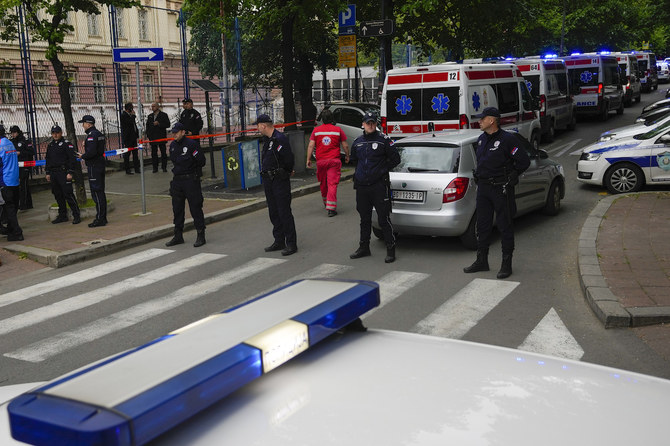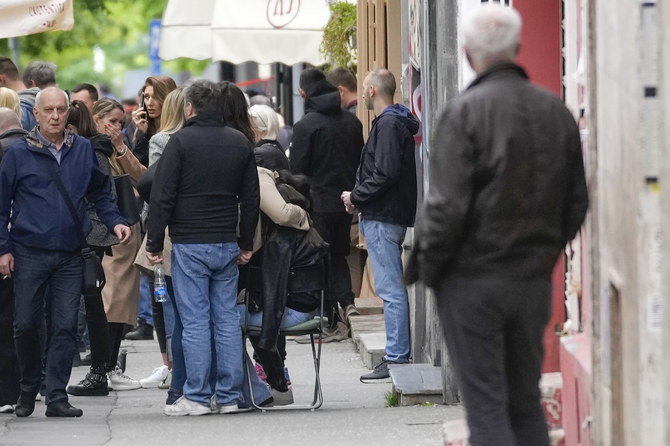BELGRADE: A teenager who opened fire Wednesday at a school in Serbia’s capital drew sketches of classrooms and wrote a list of people he intended to target in a meticulously planned attack, police said.
He killed eight fellow students and a school guard before being arrested.
The shooter first killed a guard at the school in central Belgrade and then three students in a hallway, according to senior police official Veselin Milic. He then entered a classroom — apparently choosing it simply because it was close to the entrance — and opened fire again, Milic said.
The assailant called police himself when the attack was over, though authorities had already been alerted to the shooting.
A father of a student said the shooter entered his daughter’s classroom, firing at her teacher and then her classmates as they ducked under their desks. Most students were able to flee through a back door, according to a local official.
Mass shootings are extremely rare in Serbia and in the wider Balkan region; none were reported at schools in recent years. In the last mass shooting, a Balkan war veteran in 2013 killed 13 people in a central Serbian village.
Experts, however, have repeatedly warned of the danger posed by the large number of weapons in the country after the wars of the 1990s. They also note that decades of instability stemming from the conflicts as well as the ongoing economic hardship could trigger such outbursts.
Police identified the shooter as Kosta Kecmanovic, a 13-year-old student at the Vladislav Ribnikar school, whose students would typically range in age from 6 to 15.
Police said Kecmanovic used his father’s handgun, which was licensed. Interior Minister Bratislav Gasic said the gun was kept in a safe but the teen apparently knew the code. He said the father was also arrested.
Police showed reporters a sketch they said the shooter had drawn of classrooms and Milic said he also wrote out a list of children he planned to “liquidate” in the attack that he planned for a month.
In addition to the nine killed, six children and a teacher were also hospitalized.
Local media footage showed a commotion as police removed Kecmanovic, whose head was covered as officers led him to a car. Police sealed off the blocks around the school. Authorities later carried body bags to a waiting van.
Police said they received a call about the shooting at around 8:40 a.m. on the first day that classes resumed after a long weekend for the May 1 holiday.
“I was able to hear the shooting. It was nonstop,” said a student who was in a sports class when gunfire erupted elsewhere in the building. Her mother asked that her name be withheld because of her age. “I didn’t know what was happening. We were receiving some messages on the phone.”
The student described the shooter as a “quiet guy” who had good grades.
“He was not so open with everybody. Surely I wasn’t expecting this to happen,” she said.
Milan Nedeljkovic, the mayor of the Belgrade area of Vracar where the shooting happened, said that most of the students were taken out a back door of the school.
“We have video surveillance, but now this is a lesson, we need metal detectors too,” he said. “It is a huge tragedy ... something like this (happening) in Belgrade. Such a tragedy at an elementary school.”
Four students and a teacher were sent to University hospital, according to the hospital’s director, who said one child and the teacher were in serious condition.
Milan Milosevic, who said his daughter was in a history class when the shooting took place, told N1 television that he rushed to the school when he heard what had happened. He received a call from his daughter who had gotten out of the building and was unharmed.
“He (the shooter) fired first at the teacher and then the children who ducked under the desks,” Milosevic said his daughter told him.
Police: Serbia school shooter who killed 8 had list of students to target
https://arab.news/27kh4
Police: Serbia school shooter who killed 8 had list of students to target

- The assailant called police himself when the attack was over, though authorities had already been alerted to the shooting
- Police showed reporters a sketch they said the shooter had drawn of classrooms and Milic said he also wrote out a list of children he planned to “liquidate” in the attack
Rubio says technical talks with Denmark, Greenland officials over Arctic security have begun

- US Secretary of State on Wednesday appeared eager to downplay Trump’s rift with Europe over Greenland
WASHINGTON: Technical talks between the US, Denmark and Greenland over hatching an Arctic security deal are now underway, Secretary of State Marco Rubio said on Wednesday.
The foreign ministers of Denmark and Greenland agreed to create a working group aimed at addressing differences with the US during a Washington meeting earlier this month with Vice President JD Vance and Rubio.
The group was created after President Donald Trump’s repeated calls for the US to take over Greenland, a Danish territory, in the name of countering threats from Russia and China — calls that Greenland, Denmark and European allies forcefully rejected.
“It begins today and it will be a regular process,” Rubio said of the working group, as he testified before the Senate Foreign Relations Committee. “We’re going to try to do it in a way that isn’t like a media circus every time these conversations happen, because we think that creates more flexibility on both sides to arrive at a positive outcome.”
The Danish Foreign Ministry said Wednesday’s talks focused on “how we can address US concerns about security in the Arctic while respecting the red lines of the Kingdom.” Red lines refers to the sovereignty of Greenland.
Trump’s renewed threats in recent weeks to annex Greenland, which is a semiautonomous territory of a NATO ally, has roiled US-European relations.
Trump this month announced he would slap new tariffs on Denmark and seven other European countries that opposed his takeover calls, only to abruptly drop his threats after a “framework” for a deal over access to the mineral-rich island was reached, with NATO Secretary-General Mark Rutte’s help. Few details of the agreement have emerged.
After stiff pushback from European allies to his Greenland rhetoric, Trump also announced at the World Economic Forum in Davos, Switzerland, last week that he would take off the table the possibility of using American military force to acquire Greenland.
The president backed off his tariff threats and softened his language after Wall Street suffered its biggest losses in months over concerns that Trump’s Greenland ambitions could spur a trade war and fundamentally rupture NATO, a 32-member transatlantic military alliance that’s been a linchpin of post-World War II security.
Rubio on Wednesday appeared eager to downplay Trump’s rift with Europe over Greenland.
“We’ve got a little bit of work to do, but I think we’re going to wind up in a good place, and I think you’ll hear the same from our colleagues in Europe very shortly,” Rubio said.
Rubio during Wednesday’s hearing also had a pointed exchange with Sen. Tim Kaine, D-Virginia, about Trump repeatedly referring to Greenland as Iceland while at Davos.
“Yeah, he meant to say Greenland, but I think we’re all familiar with presidents that have verbal stumbles,” Rubio said in responding to Kaine’s questions about Trump’s flub — taking a veiled dig at former President Joe Biden. “We’ve had presidents like that before. Some made a lot more than this one.”












